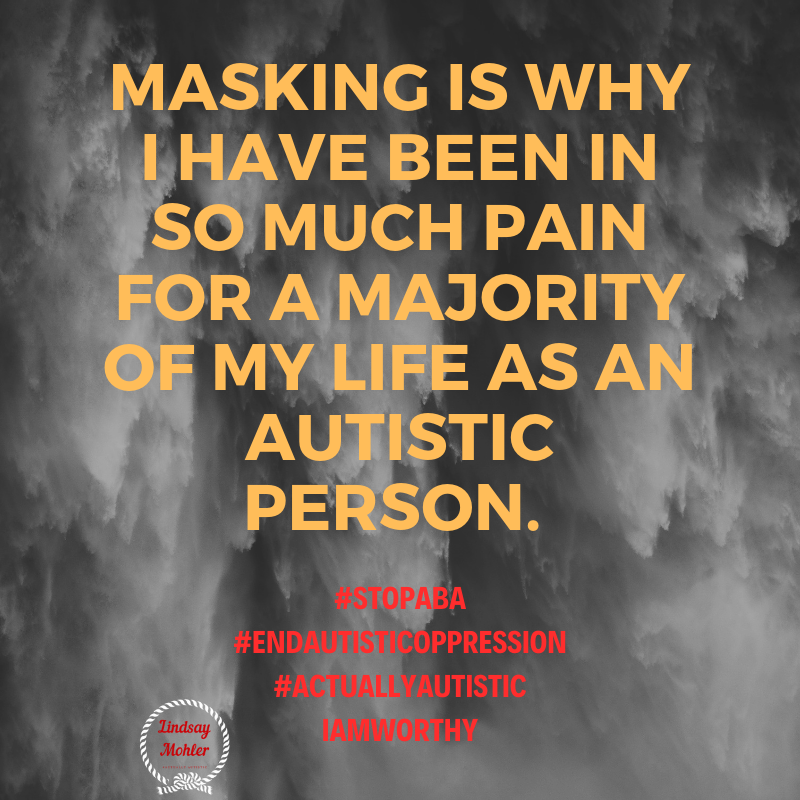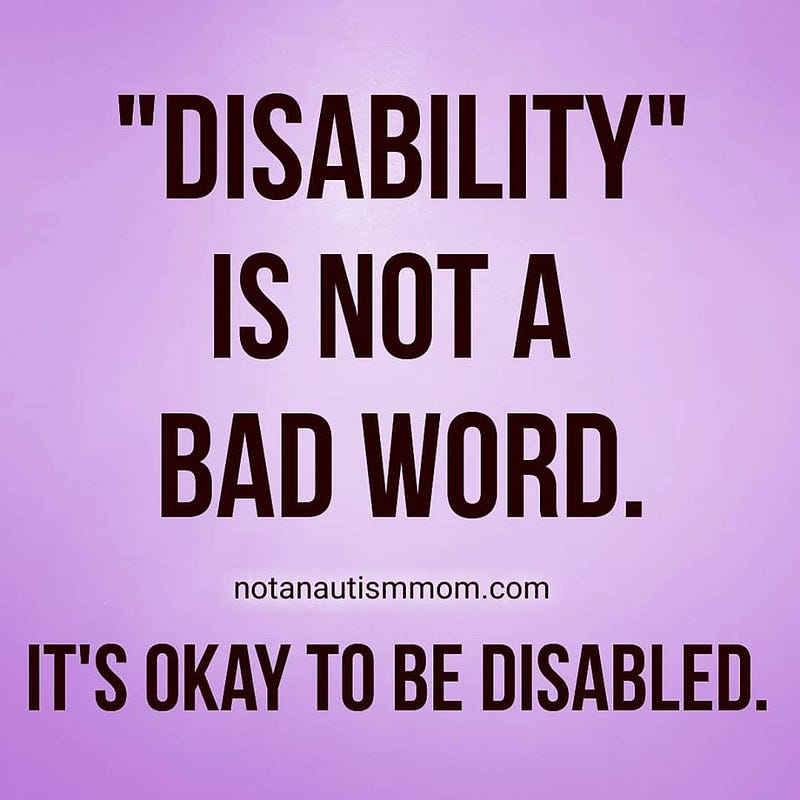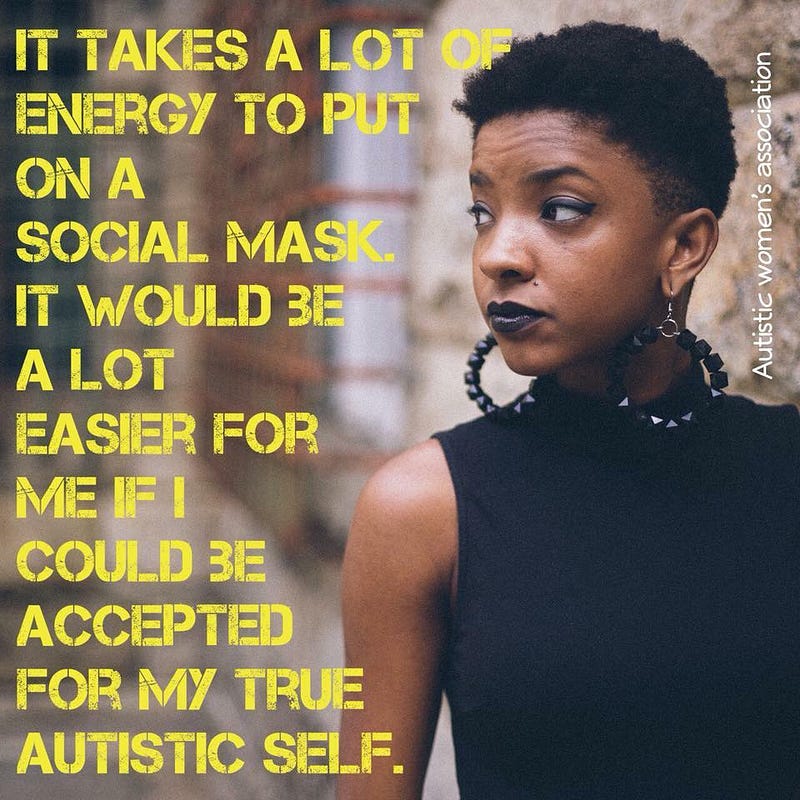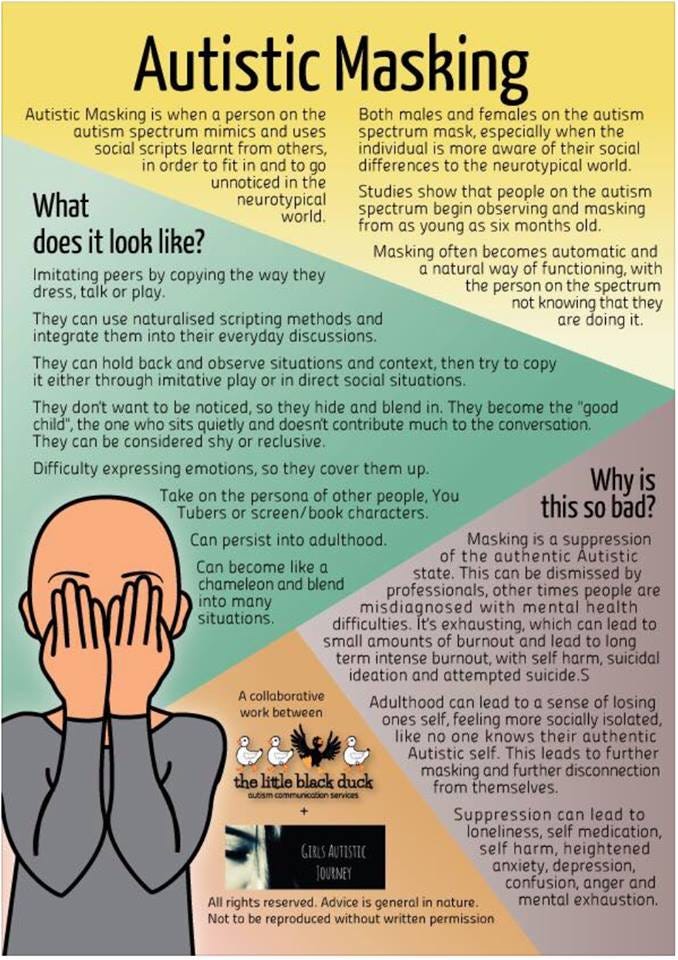UPDATED BLOG POST! ARCHIVE (2019): Masking, Ableism, and The Cost of Hiding Autism in an Ignorant Society
Masking, Ableism, and The Cost of Hiding Autism in an Ignorant Society

Currently, I am in the midst of writing two other blog posts. And you might be asking yourselves, why not submit those sooner? They are tougher subjects to touch upon, but I promise you, readers, I will get to finishing them and they will be submitted. As a part time activist, I find college to be taking much of my time right now. I wanted to write about how tired I am. Why? Why write a blog on masking? People do not understand how often we autistics do this, and it is a routine that many autistic women are often taught due to sexism, ableism, and other concerns. Society likes norms, and whenever those norms are broken, it seems like it is always the end of the world for these people. Ever since I’ve been heavily open about my disability, I’ve been unlearning all of the masking that I taught myself. And what does masking even mean?
Masking is when the autistic person is expected to hide their own behaviors in order to make other neurotypical people more comfortable.
Masking can actually cause a number of health-related concerns for autistics, including extreme anxiety, persistent burnout, persistent depression, suicidal thoughts, very low self-esteem, less sleep, lack of self-care (not entirely, but less), insecurity, etc., and people who are not autistic need to realize that behavior IS and ALWAYS will be a social construct. There is not one way to define behavior in this society. 66% of autistics are currently suicidal and masking is one of several factors in this. What are examples of masking? Masking isn’t a choice because it is due to ableism and systemic oppression. It can be several things, including but not limited to:
- Asking me to stop stimming in public or in private.
Self-stimulation helps with the autonomic nervous system. Stimming (in which theoretically I could write a separate blog post on) has multiple functions, and is necessary for autistics in order to be able to navigate a world that is not necessarily accommodating. Self-stimulation actually can calm the nervous system down, it can serve as a function to help the autistic individual concentrate and pay attention, it can be a way to relax and de-stress, it can help during meltdowns and panic attacks, etc. Stimming is hugely necessary, and fun fact: can sometimes be unhelpful. But that is up to the autistic to decide that for themselves, and not you as a neurotypical person. Examples of this are interminable, and while I enjoy stimming, I am often questioned when I stim. It’s not considered “normal”; though, what is considered normal these days, reader?

2. Expecting neurotypical ways of communication.
This is a big one because we have such a hard time with communication. People often believe that we are cold, lack empathy, etc., so the minute I even mention I am autistic to someone, that person may (or may not) treat me very differently and disrespectfully very quickly. Nonverbal communication (in which I’ve mention in past blogs is not appreciated enough in society) is not used as often as verbal communication. And people perceive communication differently. I think, often times, we’ve got people who use verbal communication only, and don’t like nonverbal communication, which can be such a barrier for people, like myself, who are systemically oppressed everyday. Expecting perfect communication every time I verbally or nonverbally respond to someone is also ableist.

3. Expecting the autistic to always be able to handle social interaction.
This is a biggie that is common. No one should have high expectations of autistics while dismissing their challenges. This is unfair and unreasonable, as well as inadequate. If I am dealing with someone venting, etc., for example (while I am dealing with my own challenges in the heat of the moment), I cannot always be aware situationally, and that may not be ideal, but it’s unfair to expect the autistic to mask. It’s not me being heartless. It just means that I need time to take care of myself and there is NOTHING wrong with self care and boundaries. Even if the interaction is polite and friendly, and I am dealing with challenges, I may not be able to handle things. I try my best to nonverbally notify people when I am having a hard time, but that is not always possible. But if everything is too much and too painful in the heat of the moment due to an unprevented meltdown or shutdown, then unfortunately I’m not going to be able to handle things in the heat of the moment because I have my own personal limitations. And there is nothing wrong with this. I try my best to not berate myself for not being able to communicate effectively when I cannot. I am a good person.
4. Demanding Compliance….aka Classical and Operant Conditioning.
So this is a big no no for so many reasons. Using the reward system to have me attain a goal of yours won’t help in the long run with negative or positive punishment because of unethical therapies like ABA, punishment that leads to abusive behavioral patterns from the parent, etc. (and these things can actually cause PTSD). Since behavior is a social construct, then that makes the parenting style flawed and autistics deserve acceptance. We don’t need your pity, we’re not burdens to raise or take care of, and we’re human beings, just like everyone else. Forcing eye contact, demanding that I do something or stop doing something just because it is considered uncomfortable to watch by someone else, etc. is not okay and toxic. What happened to consent and boundaries to parents who don’t respect their child’s autonomy?

5. Withdrawing Consent
Consent….ugh where do I even begin? Consent is a huge problem in raising autistic children with parents. I do not even believe that parents even claim to know how to raise autistic children, but then take it upon themselves to teach them neurotypical standards of social interaction. When I was a kid, my dad would expect me to hug him, or my mom would expect me to hug her, or show physical affection, simply when I did not want to be touched. And I could not always communicate, verbally, that I did not want to be touched. Thankfully I worked on touch and healing of physical touch with my college counselor at Randolph College. You do not have to have an autistic child verbally or physically show ways of saying I love you. No actually does mean no. And this also can fit in with compliance. All of these can overlap with each other.
6. Dismissing pain and other emotions that the autistic is feeling.
Ok, so this is something I am still working on healing with in my path of therapy. My parents always taught me that my pain did not matter, and their pain did. So when I show that I am in pain in front of other people, it can be very hard for me to do so. So I was forced to mask my emotions. ABA and masking did not allow me to heal from anything my parents did or the ABA therapist I worked with. So when I experience pain, I dissociate very quickly and cannot identify how I am feeling. Partially due to the PTSD and alexithymia that I have, but also partially due to the fear of being vulnerable in front of other people. Because not everyone understands meltdowns, shutdowns, etc., it is much harder for me to even feel comfortable having one in front of someone. The goal of a shutdown or meltdown is not to get the other person’s attention…. in fact, if anything, it is the opposite; I do not want to socially interact at all. I need a release, and go hide in order to get that release. Dismissing pain and other emotions only furthers negative impacts on the mental health of the autistic person.
7. Demanding that the autistic be earning social approval for everything
If I do not comply, therefore, why should I be required to earn the right to socialize with others? What good does that do for anyone? I had a cognitive behavioral therapist who would tell me HOW I needed to interact with others, while refusing to lighten up on her own ignorances. Just because I communicate in a way that most people don’t, does not make it incorrect or fixable. I am able to do things and ask for help. Please do not always assume disabled people need to be helped out. I don’t always need help, and that is not up for the non-disabled person to decide. If I ask for help on verbal communication, then that means you can help. But shoving your ableist expectations down my throat is inequitable.
There could be more I could add to this list, and may come back over time; however, I hope this has helped give you perspective, reader. ABA, masking, etc. are all negative things, and the more we unlearn these bad habits as people, the more success we have down the road at helping autistics thrive in a society that is not so welcoming or adapting.
Thanks for reading.


Comments
Post a Comment